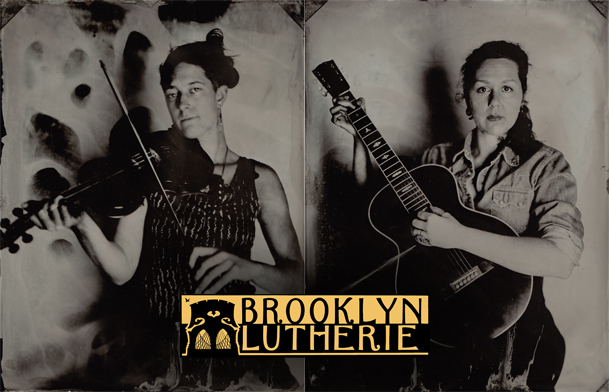The WiMN’s Front and Center is a weekly column that showcases accomplished women who work in the music and audio industries. We spotlight successful female performers, manufacturers, retailers, educators, managers, publicists, and everyone else in between. Want to be featured? Learn how here.
Front and Center: Brooklyn Lutherie Founders, Chloe Swantner and Mamie Minch

Founders of the brand new Brooklyn Lutherie instrument repair shop, Chloe Swantner and Mamie Minch are combining their years of experience in instrument repair with a forward-thinking business model.
As quoted from the Brooklyn Lutherie website, “we want our repair shop to be a place where musicians of all skill levels and particularly women feel comfortable and confident bringing their instruments.”
As the only female-owned and operated repair shop in New York, Brooklyn Lutherie serves the community’s thriving music scene, ensuring NYC’s favorite artists get the most out of their instruments. And whether beginner or pro, all are treated with respect, and given the same level of top-knotch craftsmanship.
Below, we sit down with Swantner and Minch to learn about their background in instrument repair, the mission behind Brooklyn Lutherie, and much more. Check them out online at brooklynlutherie.com, and if you’re in the NYC area, be sure to stop by the shop!
WiMN: What attracted you to the field of lutherie? How did you develop your skills and who are some of your greatest teachers/inspirers?
CS: I’ve been playing fiddle since I was a beanstalk. I never really thought about violins being built by ordinary people until I met a guy sailing down the coast of Maine with a violin under construction in the cabin down below. I was truly fixated after seeing his little floating shop of small hand tools. I became really attracted to the portable aspect of lutherie, as well as working predominately with hand tools.
Later on that year I temporarily abandoned the track to becoming a marine biologist, and found a master violinmaker in Vermont under whom to apprentice. I studied with this violinmaker Thurmond Knight for a year, during which I made two violins and a five-string violin.
After moving to New York, I began working at a variety of instrument repair shops including The Jalopy Theater and School of Music, David Gage Basses and Retrofret Vintage Guitars. Through my wide range of experiences at these shops I came to hone my repair and restoration skills. In January of 2014, my co-worker of the past 4 years Mamie Minch and I decided to soar out by ourselves and create our own repair shop, and Brooklyn Lutherie was founded.
MM: I got hooked on tinkering with instruments after becoming a player. My previous formal training had been in fine art printmaking, so the super small motor skills stuff and problem solving made a lot of sense to my way of thinking. Plus it’s really fun to get your hands on all these cool instruments.
I didn’t go to school for this, but I rather had an informal apprenticeship at Retrofret Vintage Guitars. I started off by doing small tasks, got into fretwork, and built on the experience until I was head of repair, a position I held there for five years. I’ve traded tips and stories with lots of other luthiers and repair people since, and have become part of this great community of luthiers who share recommendations and thoughts about jobs, business, philosophy.
Flip Scipio is a wonderfully talented local luthier and a friend. The fellows at Stewart McDonald have been supportive and helpful, including Dan Erlewine and Erick Coleman. Also, builders like Linda Manzer, Michael Greenfield, and Kathy Wingert are doing really exciting things.
WiMN: What led up to the creation of Brooklyn Lutherie? What is the mission of the shop and how is it different?
CS: One of the main tenets of Brooklyn Lutherie is providing honest and high-quality repair services to the working musicians of New York; maintaining a very approachable and comfortable platform for musicians of all ilks to feel respected and have their musical needs accommodated. It is the only female-owned and operated repair shop in the city! We are unique in that we work on both fretted and violin-family instruments, both acoustic and electric. We aim to be a one-stop shop.
MM: We started this shop because we wanted to create our own environment with our values at the center. We’ve made it a place where working musicians and front porch pickers alike can get work done at reasonable rates by techs who are interested in collaborating with them. We’re also different in that between the two of us, we bring a bunch of different working experiences to the table. Chloe’s background in orchestral strings is really strong, and we handle fretted AND violin family instruments here. I think the biggest difference between our shop and other local shops is the collaborative spirit – you get twice the tech when you bring your instrument to us!
WiMN: Are there any particular instruments you’ve worked on with some interesting stories?
CS: My favorite instruments to work on are those with an amount of history that they carry with them. There’s something magical about a violin that’s been passed from generation to generation, no matter if it’s a simple student grade factory instrument or something more unique and hand-made. You can tell when an instrument has been loved and adored and when passionate tunes have been culled from its resonating body.
MM: Well, there are so many… I love when a little detail will reveal the way an instrument had been played, or a little something about the owner, like a personalized pickguard or a note inside a case. I’ve worked on instruments with handpainted names on the front including “Curley,” “Flossie,” “Doodles,” and “Prince Fong.” Then there are the peices that were built in a particularly interesting time and place – like the Gibson Banner guitars built almost exclusively by the women working in the factory while all the men were at war. Instruments are truly functional bits of history that are integrated into people’s lives – they are special objects.
WiMN: What are some of the most exotic or difficult instruments you’ve repaired?
CS: I’ve worked on Norwegian hardanger fiddles adorned with mother of pearl on every surface, a Bulgarian cobza with 12 strings, a stroh-cello, and a banjo cello. I’ve fabricated an olive oil can ukulele, and a violin with a walrus head in place of the scroll, bedecked with antler tusks and cat-whiskers.
MM: Hmm…. a 1917 Dyer Style 7 Harp Guitar ranks up there; it’s like a guitar swallowed a dolphin with art nouveau details. Chloe just built an olive oil can uke for a clown. There’ve been aluminum basses, a couple original Bigsbys, and guitars from Les Paul’s collection.
WiMN: What advice would you share with an aspiring female luthier?
CS: You go girl! The world is your oyster. No matter who or what tries to discourage you time and again from following your passion, stay steady, sure-footed and guided by your intuition, and you will find gratification and enjoyment – and learn a lot along the way.
MM: Don’t let ’em get you down! This is a great job, and more and more women are becoming part of our community. For me, it’s been a real journey of self-discovery, not to be overly new agey. It’s empowering to be useful, it’s awesome to work with musicians, and generally, people love it when you take care of their treasured instrument. Anyone who would diminish your hard work is not seeing clearly, which is their problem and not yours. Keep your chin up and surround yourself with positive people.
WiMN: Can you share your experience as a woman in the industry? Have there been any challenges?
CS: At some of the shops I’ve worked at, customers will come in and scan the shop for the expected dude guitar tech, passing right by the lady with the expertise and the leather apron who’s ready to help. I definitely have to slough off the occasional preconceptions from the masculine guitar world, but I will never fail to break the mold and stand tall as a female luthier who’s studied and climbed the ropes like the best of them.
MM: It can be challenging to not see a lot of faces like your own. Ever been to a guitar show? You won’t see many women, and it can be a lot of pressure to feel like you have to fully represent all the time. But this is changing, and can only keep changing.
WiMN: What’s in store for Brooklyn Lutherie for the reminder of the year?
CS: The Lutherie is working hard to establish our place as a steadfast fixture in the East Coast instrument repair community. We are gonna keep chiselling along, making great friends in our clients, and keeping New York’s favorite musicians on the stage and getting the most out of their instruments like they deserve.
MM: We’ve just hit our 6-month mark, and honestly we’re doing better than we could’ve imagined! We must be doing something right…
Enjoy this article? Become a member of the WiMN today! It’s free, and you can signup here>>








